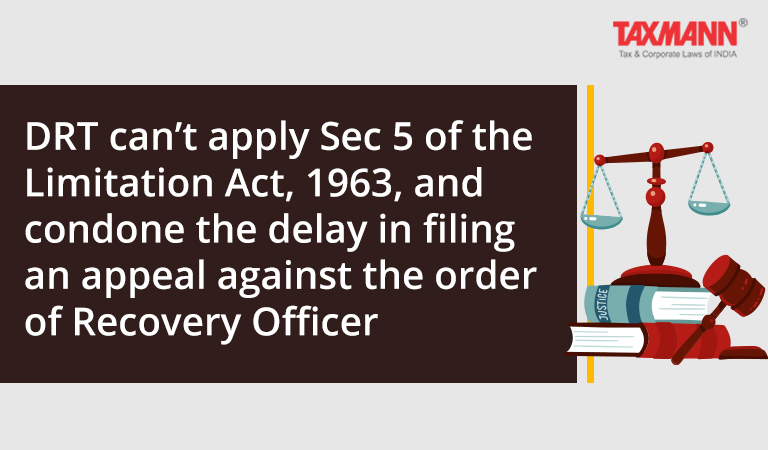DRT can’t apply Sec 5 of the Limitation Act, 1963, and condone the delay in filing an appeal against the order of Recovery Officer
- News|Blog|FEMA & Banking|
- 2 Min Read
- By Taxmann
- |
- Last Updated on 27 November, 2021

Case Details: Avneesh Chandan Gadgil v. Oriental Bank of Commerce - [2021] 132 taxmann.com 262 (SC)
Judiciary and Counsel Details
-
- M.R. Shah and Sanjiv Khanna, JJ.
Facts of the Case
In the instant case, Bank committed a delay of 31 days in filing appeal u/s 30 of the RDB Act,1993 to DRT against the order of the Recovery Officer. DRT condoned the delay in filing an appeal by applying section 5 of the Limitation Act,1963. Thereafter, an appeal is filed with DRAT and DRAT quashed the order passed by DRT.
Appeal against the order by DRAT was filed and the High Court quashed and set aside the order passed by the DRAT which stated to set aside the order passed by the DRT condoning the delay in preferring the appeal under Section 30 of the Recovery of Debts due to Banks and Financial Institutions Act, 1993. Then appeal is filed against the impugned judgment passed by the High Court.
Supreme Court Held
The Supreme court held that the DRAT was right in quashing DRT’s order condoning the delay of 31 days by the Bank in filing an appeal against the order of the Recovery Officer. Given the above, the High Court has committed a grave error in quashing and setting aside the order passed by the DRAT and in restoring the order passed by the Debts Recovery Tribunal condoning the delay in preferring the appeal under Section 30 by applying Section 5 of the Limitation Act.
SC observed that the issue involved in the present appeal is not res Integra in view of the decision of this Court in International Asset Reconstruction Co. of India Ltd. vs. Official Liquidator of Aldrich Pharmaceuticals Ltd. & Ors., where it was held that Sec. 5 of the Limitation Act is specifically excluded so far as appeal u/s 30 of the BFI Act is concerned.
Further, highlighting that the case relied upon by HC has been overruled by the SC decision in International Asset Reconstruction Co. of India Ltd., SC states “…High Court has committed a grave error in…condoning the delay in preferring the appeal under Section 30 by applying Section 5 of the Limitation Act.”; In conclusion, retelling that Section 5 of the Limitation Act shall not apply to an appeal against the order of the Recovery Officer.
The order passed by the DRAT setting aside the order passed by the Debts Recovery Tribunal is restored.
Disclaimer: The content/information published on the website is only for general information of the user and shall not be construed as legal advice. While the Taxmann has exercised reasonable efforts to ensure the veracity of information/content published, Taxmann shall be under no liability in any manner whatsoever for incorrect information, if any.

Taxmann Publications has a dedicated in-house Research & Editorial Team. This team consists of a team of Chartered Accountants, Company Secretaries, and Lawyers. This team works under the guidance and supervision of editor-in-chief Mr Rakesh Bhargava.
The Research and Editorial Team is responsible for developing reliable and accurate content for the readers. The team follows the six-sigma approach to achieve the benchmark of zero error in its publications and research platforms. The team ensures that the following publication guidelines are thoroughly followed while developing the content:
- The statutory material is obtained only from the authorized and reliable sources
- All the latest developments in the judicial and legislative fields are covered
- Prepare the analytical write-ups on current, controversial, and important issues to help the readers to understand the concept and its implications
- Every content published by Taxmann is complete, accurate and lucid
- All evidence-based statements are supported with proper reference to Section, Circular No., Notification No. or citations
- The golden rules of grammar, style and consistency are thoroughly followed
- Font and size that’s easy to read and remain consistent across all imprint and digital publications are applied



 CA | CS | CMA
CA | CS | CMA
